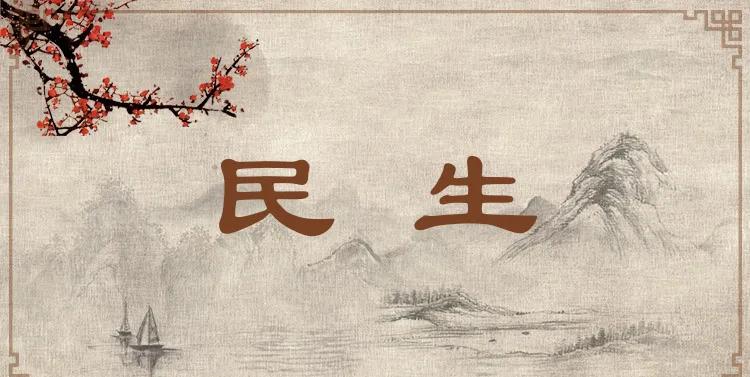#Chinese Culture# Minsheng (mín shēng)
(1) The life of the masses of the people. (2) The people. By extension, the nature of the people and the livelihood of the people.
Minsheng is also one of the names of the Ming and Qing Dynasty Guozi supervisors. The Ming Dynasty refers to the invigilators whose children of ordinary households entered the State Zijian in the language of the General Sense, and the invigilators who obtained the qualification to enter the Guozijian through Nasu, Nama or Nayin after Jingtai. Also known as Junxiu. To distinguish it from the official students who are imprisoned as the children of the officials. In the Qing Dynasty, it was said that the children of ordinary private households were imprisoned as prisoners, including Gongsheng and Gongsheng, Liao, Zeng, and Appendage Literary and Artistic Excellence, who were selected by the Academic And Political Examination to be imprisoned and read.
The people's livelihood is diligent, and the diligence is not poor. (The Twelve Years of Zuo Chuan Xuangong)
Internal governance is lacking and then the horse is born, and the people's livelihood is promoted and then thieves rise. (Ji Liuqi, "Ming Ji Beiluo, Volume XVIII, Wu Luzhong on Two Losses")
Heaven is generous to the people's livelihood, and it is advisable to give it a slow time. (Huang Zongxi, "Ming Confucianism Case, Xueshan Study Case, Zhongduan Liu Niantai Mr. Zong Zhou")
䫊(péi)
Same with the word "䪹". The face is wide.
Zhonggu 馔玉 (zhōng gǔ zhuàn yù)
Fingers ring bells and drums, food delicacies. Describe the life of wealth and luxury. From Tang Libai's poem "Will Enter the Wine": "The bell and drum are not expensive enough, but I hope to be drunk and do not want to wake up." ”
The clothes are splendid, the bells and drums are jade, peeling off the self-lubrication, without seeing its difficulties. (Ming Zhang Juzheng's "Learning to Farm")
Zhongshu (zhōng shū)
1. The collection of books in the imperial palace. It also refers specifically to the book of the chronicles in the palace. 2. Official name. The name of the province of Zhongshu Ling. The Han Dynasty set up the Zhongshu Order, which was in charge of the edict, and the eunuchs were appointed, and many famous people were appointed later. "The Biography of Xiao Wang" of the Book of Han: "Wangzhi thinks that it is a political book in the Middle Book, and it is advisable to choose a wise man." Jin Yuliang's "Let Zhongshu Order Table": "The country is gracious, and the zhongshu is restored to the subject." "The Sui and Tang Dynasties used Zhongshu Ling, Shizhong, and Shang Shu Ling to discuss state affairs together, and they all became prime ministers, and later they were called prime ministers because of Zhongshu. 3. Official name. Zhongshu Sheren's provincial name. During the Sui and Tang dynasties, he was a subordinate official of Zhongshu Province. The Ming and Qing dynasties abolished Zhongshu Province, and set up Zhongshu Sheren in the cabinet to write and write things. 4. Official signature. Zhongshu Province in the Tang Dynasty and government affairs hall in the Song Dynasty were also directly referred to as "Zhongshu". 5. The alias of the brush, the provincial name of "Zhongshu Jun".
When Emperor Cheng asked for his ancient texts, he thought that he could do it for one hundred and two signs, and he used the Zhongshu school to learn it, not to be. (Book of Han, Vol. 88, Ru Lin Biography, Kong An Guo Biography)
And in the Dongguan School Zhongshu Five Classics biography, supplementing the Han Records. (Book of the Later Han Dynasty, vol. 64, Lu Zhi's Biography)
Wen Lugong was in the Shufu, tasting the Zhongshu for a day, and Jing Gongxing to the title, and reciting poems late. (Song Ye Shaoyun's "Poetry of the Stone Forest" in volumes)
